|
|
|
Sort Order |
|
|
|
Items / Page
|
|
|
|
|
|
|
| Srl | Item |
| 1 |
ID:
112189


|
|
|
|
|
| Publication |
2012.
|
| Summary/Abstract |
The main objective of this article is to highlight the challenge of maritime security in the region geographically bounded by the Indian Ocean. It studies the current status of maritime security in the region from both the traditional and non-traditional points of view. From the traditional security perspective, it examines the strategic interests of the major Indian Ocean players-the China-India competition and India-US relations in particular-in addition to the existing maritime disputes among the littoral states. The non-traditional security angle includes sea lines of communication (SLOCs), piracy, maritime terrorism, natural disasters and other crimes with a maritime dimension. There is a convergence of interests between both the littoral and user states for charting a maritime security cooperation mechanism which envisages a sharing of responsibilities in order to achieve the short-term and long-term maritime security of the Indian Ocean.
|
|
|
|
|
|
|
|
|
|
|
|
|
|
|
|
| 2 |
ID:
127744
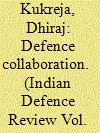

|
|
|
| 3 |
ID:
133405
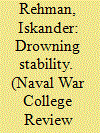

|
|
|
|
|
| Publication |
2012.
|
| Summary/Abstract |
In May 1998, the sun-scorched deserts of the Indian state of Rajasthan shook with a succession of nuclear explosions. Barely two weeks later, in a seemingly tit-for-tat response, Pakistan conducted its own series of detonations, in the remote western hills of Baluchistan. Both nations' previously concealed nuclear capabilities had suddenly burst out into the open, giving a new and terrifying form to the enduring rivalry that had convulsed the subcontinent for decades. Caught off guard, the international community reacted with indignation and dismay. Concerns over nuclear escalation in the event of another Indo-Pakistani conflict refocused Washington's attention on South Asia and triggered the longest sustained level of bilateral Indo-American engagement in history. This had the unexpected benefit of enabling both democracies finally to find common ground, after many years of acrimony, chronic mistrust, and squandered opportunities. Fears of mass terrorism in the wake of 9/11 and subsequent revelations of extensive proliferation emanating from Pakistan added urgency to Western desires to preserve a modicum of crisis stability in South Asia, as well as to prevent any form of escalatory behavior that could spiral into nuclear conflict or further the spread of radioactive material.
|
|
|
|
|
|
|
|
|
|
|
|
|
|
|
|
| 4 |
ID:
188780
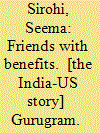

|
|
|
|
|
| Publication |
Gurugram, HarperCollins Publishers, 2023.
|
| Description |
xiii, 491p.pbk
|
| Standard Number |
9789356295902
|
|
|
|
|
|
|
|
|
|
|
|
Copies: C:1/I:0,R:0,Q:0
Circulation
| Accession# | Call# | Current Location | Status | Policy | Location |
| 060307 | 327.54073/SIR 060307 | Main | On Shelf | General | |
|
|
|
|
| 5 |
ID:
112988
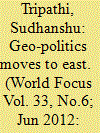

|
|
|
| 6 |
ID:
130876
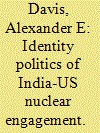

|
|
|
|
|
| Publication |
2014.
|
| Summary/Abstract |
Although its precise definition is contested, the concept of the 'Anglosphere' has grown in political discourse in the past decade. Anglospherist authors have defined it as a group of states tied together on the basis of shared tradition, laws, liberty and language. And yet they do not discuss India substantively, placing it firmly on the outside of its hierarchy. Others have argued the concept is based in a racialised, Anglo-Saxon identity. In 2005, Manmohan Singh surprised some domestic observers by emphasising India's positive connections to the 'English-speaking world' while speaking at Oxford University. Shortly after, India announced negotiations on a civil nuclear agreement with the US, leading to similar agreements with Canada, the UK and Australia. This article uses the contemporary India-US nuclear engagement to investigate India's position in relation to the ideational space of the Anglosphere and how this shapes India-Anglosphere relations. It is argued that India's postcolonial scepticism towards this space combined with the inherent anglocentrism in Anglosphere identity discourse limits India-Anglosphere relations while simultaneously animating nuclear engagement.
|
|
|
|
|
|
|
|
|
|
|
|
|
|
|
|
| 7 |
ID:
146953
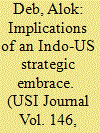

|
|
|
| 8 |
ID:
178588
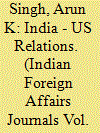

|
|
|
| 9 |
ID:
130197
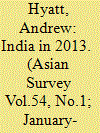

|
|
|
|
|
| Publication |
2014.
|
| Summary/Abstract |
The Congress-led coalition battled through another difficult year with issues of governance continuing to cause difficulty for the government. The economy performed unevenly, with high rates of inflation and slower economic growth. Close relations were maintained with the U.S., but relations with China remained awkward. Pakistan and India made little headway on improving relations. Campaigning for the 2014 general election began midway through 2013.
|
|
|
|
|
|
|
|
|
|
|
|
|
|
|
|
| 10 |
ID:
119289
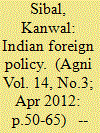

|
|
|
| 11 |
ID:
125323
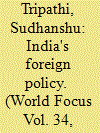

|
|
|
|
|
| Publication |
2013.
|
| Summary/Abstract |
Despite all structural changes and adjustments made in the traditional foreign policy since the end of Cold War, India is still being considered as a soft power in the world and that has failed it's all-out effort to achieve its long - cherished dream of a great power status and a dominant player in the contemporary international system and it has also not yet become a permanent member of the United Nation's Security Council; all because of unclear foreign policy framework and absence of a sound and effective strategy, meaning thereby, a method for use of social, economic, political, cultural, military, science &technological developments etc. together as inputs of power for pursuing and advancing the national interests by a country.
|
|
|
|
|
|
|
|
|
|
|
|
|
|
|
|
| 12 |
ID:
104390
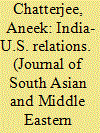

|
|
|
| 13 |
ID:
140017
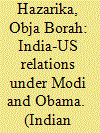

|
|
|
|
|
| Summary/Abstract |
Notwithstanding these contentions, cooperative relations between India and the US have become the mainstay of their relations in the post-Cold War era and the Modi government seems keen to further bolster the ties. India hopes to get US support to emerge as an economically, technologically and militarily vibrant country and the US views India as a valued partner, which can further the American vision of a stable Asia. Steps taken by Modi and Obama, however incremental, are symptomatic of the leaders’ understanding that India and the US have stakes in shaping the Indo-Pacific region in particular and the world in general in terms favourable to them, which will be best achieved through cooperation between the two nations.
|
|
|
|
|
|
|
|
|
|
|
|
|
|
|
|
| 14 |
ID:
117150
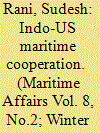

|
|
|
|
|
| Publication |
2012.
|
| Summary/Abstract |
In 1991, after the denouement of the Soviet Union and the end of the bipolar world, major changes took place at the international level. In the wake of these changes, India and the US had to re-adjust their policies and relations that led to cordial India-US relations. Maritime relations were not immune to these winds of change. In the maritime domain, India has adopted a different attitude towards the US presence in the Indian Ocean as compared to the Cold War period. The United States has also recognized India as a major security provider in the Indian Ocean Region (IOR) as the Indian Navy is the largest force in the region. Through the maritime cooperation, both nations can provide the secure and stable environment in the IOR, which is the stated aim of both the countries. In this regard, this paper tries to analyse India-US maritime relations during the Cold War era as well as the post-Cold War period.
|
|
|
|
|
|
|
|
|
|
|
|
|
|
|
|
| 15 |
ID:
140019
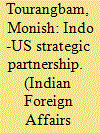

|
|
|
|
|
| Summary/Abstract |
So, at the end, the question really is not ‘who’s afraid of an alliance’, but ‘who needs an alliance’. Given the current geopolitical and geoeconomic dimensions involving India and the USA, Cold War type strict alliances – with clear demarcations about who’s on who’s side, and based on the idea of the existence of an ‘absolute other’ on all vectors of the relationship – may not be how it plays out. Alliances presume a threat perception and, given the nature of India-China, Sino-US, and India-US relations, and the complex interdependence that entwines them, building alliances and counter-alliances may not be the best answer to both India’s and America’s strategic needs. The way to a sustainable and stronger strategic partnership can only be built through a comprehensive and inclusive convergence aimed at progress, and through a single track strategic rationale of a threat from China’s rise. Hence, both sides need not be receptive and protective of all that each side says and does. Having said that, an initiative should not also be discarded just because it is American in origin – especially if it passes the test of interest and operational convergence. Though a constant reminder of what each country has done for the other is not a recipe for a sustainable relationship, a businesslike attitude towards why the two countries need each other, and how both could complement each other in the short, medium and long term, could be a pragmatic perspective on how to go forward together.
|
|
|
|
|
|
|
|
|
|
|
|
|
|
|
|
| 16 |
ID:
188781
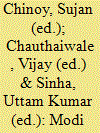

|
|
|
|
|
| Publication |
New Delhi, Wisdom Tree, 2023.
|
| Description |
xxvii, 344p.hbk
|
| Standard Number |
9788183285964
|
|
|
|
|
|
|
|
|
|
|
|
Copies: C:1/I:0,R:0,Q:0
Circulation
| Accession# | Call# | Current Location | Status | Policy | Location |
| 060311 | 327.54/CHI 060311 | Main | On Shelf | General | |
|
|
|
|
| 17 |
ID:
157620
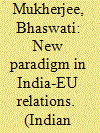

|
|
|
|
|
| Summary/Abstract |
Does India regard the EU as a significant actor or prefers the bilateral approach towards individual member countries? Is it a dialectical relationship? How do India’s relations with the USA impact India-EU relations? Jean Luc Racine makes a cynical assessment about the EU-India-US triangular relationship. He acknowledges: “Some will deride Europe as a ‘bawdy old lady’, known for over 400 years, but with ‘no excitement, no passion’ left. The romance is with America, even if it is ‘tough love’, because the US was more open to migrants and is more prone to change the world.”
What adds complexity to this task is that conceptually India, post 1947, is regarded as a ‘modern state’, with the attributes of sovereignty, territoriality, and raison d’état (justification of sovereignty).In contrast, the EU is considered to be a ‘post modern intra state entity’ which does not emphasise sovereignty, the separation of domestic and foreign affairs, and which, after Schengen, increasingly regards borders as irrelevant. It is generally considered that the EU as a ‘post modern actor’ does not base its foreign policy on the balance of power and zero sum logic. There is no doubt that its inability to develop and implement a coherent and strong Common Foreign and Security Policy (CFSP) has sent wrong signals to its strategic partners, including India.
|
|
|
|
|
|
|
|
|
|
|
|
|
|
|
|
| 18 |
ID:
118296
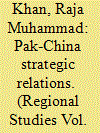

|
|
|
| 19 |
ID:
131593
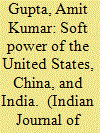

|
|
|
|
|
| Publication |
2013.
|
| Summary/Abstract |
As countries compete for dominance in International Politics, soft power has emerged as a major tool for nation states to ensure enhancement of their intangible standing, besides strengthening their in?uence in a benign way. The United States, China and India are considered prime examples in the ?eld of soft power, though the nature, intent, and fruition of soft power vary in each case. This article attempts to highlight and analyze the diverse nature of soft power that these countries possess, and illuminate as to how di?etently they have used their soft power resources. And ?nally an attempt has been made to put forward a case that each of these countries presents itself as an archetype-- they may learn from each other's successes and missteps in the domain of soft power.
|
|
|
|
|
|
|
|
|
|
|
|
|
|
|
|
| 20 |
ID:
189078
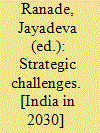

|
|
|
|
|
| Publication |
Gurugram, HarperCollins Publishers, 2022.
|
| Description |
xxviii, 307p.pbk
|
| Standard Number |
9789356291959
|
|
|
|
|
|
|
|
|
|
|
|
Copies: C:1/I:0,R:0,Q:0
Circulation
| Accession# | Call# | Current Location | Status | Policy | Location |
| 060321 | 355.3054/RAN 060321 | Main | On Shelf | General | |
|
|
|
|
|
|
|
|
|